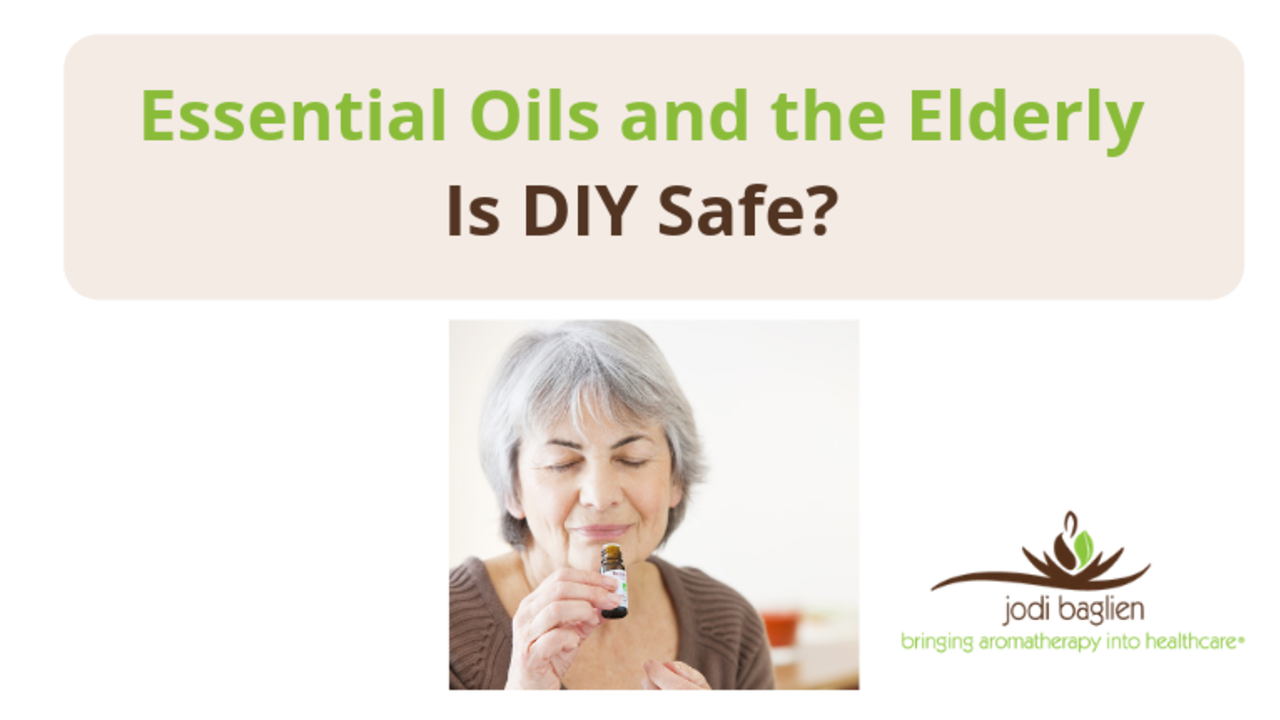Essential Oils and the Elderly - Is DIY Safe?

Interest in Holistic Care
I love getting the calls from senior communities looking to start an aromatherapy program. I am always energized to hear that healthcare facilities are seeing the value in holistic care and the power of essential oil therapies. But as a Certified Clinical Aromatherapist, I am also very aware of the risks of using essential oils without proper training, especially with a vulnerable population.
The DIY Approach in Healthcare Environments
I see many "do it yourself" (DIY) attempts. Most are driven by an essential oil lover, and many do have experience with EO's themselves. Some have formal education through a recognized aromatherapy program, while others may have attended a workshop or are led by a direct sales team.
It's important to point out that experience with home use of essential oils vs developing a compliant aromatherapy program to serve vulnerable & aging adults are two very different ends of the healthcare continuum.
Here’s When I Get Concerned…
When sites without a program or the proper education are -
- Applying undiluted and very strong oils to elderly skin.
- Diffusing oils with very strong therapeutic actions that not appropriate for use in common areas.
- Bringing in essential oils through activities, which is awesome, but often without safety guidelines in place.
Don't let your site be the one that makes the evening news about that poor woman who's had an adverse reaction essential oils!
Consider These Comparisons
What if you decided to offer Massage Therapy at your site. I expect you would only hire someone with the required minimum 500 hours of training and a certification from an approved massage school. Right?
Choosing someone that had a “great touch” or attended a few workshops would never even be a consideration.
Or, how about if I suggest you start giving out herbs and supplements to support pain, stress and sleep measures. They are all natural, so it should be fine. Let’s try some Gingko Biloba for memory function, St. Johns Wort for depression, or Glucosamine for joint pain.
Would you feel comfortable giving herbs and supplements without knowing what the safe dosage range is, the contraindications, and what adverse reactions look like?
Doubtful.
So, why are untrained people making the decisions and using essential oils on vulnerable populations in skilled nursing facilities?

A common call that I receive
"We are wondering if you can give us some guidelines about how to use essential oils with our seniors. We have been applying the oils, and we bought a few diffusers, which we run in the common areas. We're now realizing we need a more clearly defined care plan."
What makes this call one of my favorites?
Because this is what I hear:
- They are trying to help our residents/patients who are feeling anxious, depressed, in pain or not sleeping well – in ways other than drugs
- They have probably personally experienced the benefits of essential oils
- They are willing to try new ideas and invest the time to implement them
I applaud them. They care.
They are also striving to meet the national mandate required by the Center for Medicare/Medicaid Services (CMS) to provide non-drug options for moods, stress, behaviors, and pain.
All they are missing is education and certification or buying a structured program designed within best practices of clinical aromatherapy by an aromatherapist.
Choices on how to best implement Aromatherapy for the Elderly
Become a Certified Aromatherapist for your organization
You can find programs from recognized schools from our two professional associations: Alliance of International Aromatherapists (AIA) or the National Association for Holistic Aromatherapists (NAHA). Aromatherapy programs start at a minimum of 200 hours and range up to 400 hours to receive certification. Then you have the skills needed to create your own internal program and staff education.
Enroll in a Ready-to-Use Aromatherapy program with proven results
To implement an Aromatherapy Program quickly and safely, the other option is to enroll in a turnkey program. This way your lead team receives the education necessary - a step-by-step process with clearly defined procedures.
I suggest when you are vetting any Aromatherapy Program that you’re interested in, you should:
- Verify that it’s been developed by a Certified Clinical Aromatherapist
- Request testimonials from current facilities who are currently experiencing benefits from the program
- Request to see research and results from customers who’ve implemented the program
- Ensure that there is a point of contact with the company that is available for any questions both before and after the sale
The takeaway message is this
Aromatherapy is a skilled therapy and should be treated as such. We wouldn’t “experiment” with any other kind of modality. We would demand proper procedures, protocols, and education to ensure safety for the vulnerable population that we serve.
When the proper guidelines are followed, the results can be a glowing survey, improved quality measures, and peace of mind for both staff and residents.
Now that's something to celebrate!
Stay connected with us for updates, success stories, and Aromatherapy musings!
Be a part of the culture shift - receive information about Aromatherapy in healthcare.
Don't worry, we don't send too much and your information will not be shared.
50% Complete
Two Step
Lorem ipsum dolor sit amet, consectetur adipiscing elit, sed do eiusmod tempor incididunt ut labore et dolore magna aliqua.

